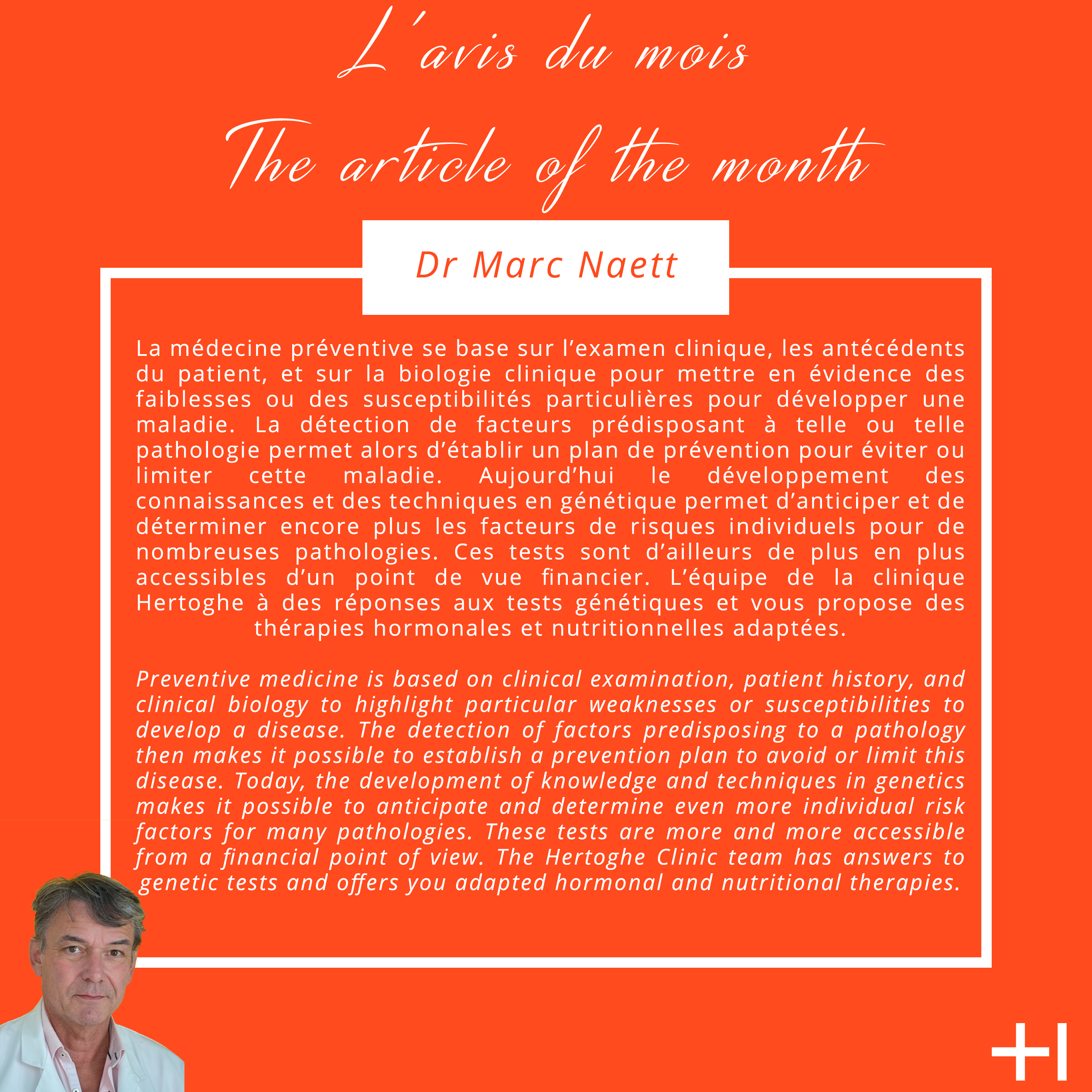The Article of the Month : April “The importance of genetic testing” Dr. Naett
 Preventive medicine is based on clinical examination, patient history, and clinical biology to highlight particular weaknesses or susceptibilities to develop a disease. The detection of factors predisposing to a pathology then makes it possible to establish a prevention plan to avoid or limit this disease. Today, the development of knowledge and techniques in genetics makes it possible to anticipate and determine even more individual risk factors for many pathologies. These tests are more and more accessible from a financial point of view.
Preventive medicine is based on clinical examination, patient history, and clinical biology to highlight particular weaknesses or susceptibilities to develop a disease. The detection of factors predisposing to a pathology then makes it possible to establish a prevention plan to avoid or limit this disease. Today, the development of knowledge and techniques in genetics makes it possible to anticipate and determine even more individual risk factors for many pathologies. These tests are more and more accessible from a financial point of view.
It is possible by sending a simple smear of the mouth to get the complete sequence of its DNA. But what to do with more than two billion pieces of information that can hardly be deciphered and therefore use? What is the benefit of learning that one is twice as likely as the average to develop a chronic disease or cancer apart from unnecessarily worrying the patient if there is no therapeutic action? For information to be useful it is necessary to be able to establish or quantify a particular risk and to be able to provide an effective and measurable preventive or corrective solution. The Hertoghe Clinic team has answers to genetic tests and offers you adapted hormonal and nutritional therapies.
Laboratories now do various genetic tests in addition to traditional biology. Two types of tests can be distinguished:
– Tests that show a genetic modification that blocks the formation of molecules essential for normal metabolism, and we must then be able to compensate for this lack. This is the case for lactose and histamine intolerance and for fucosyl deficiency that cause chronic digestive disorders. In these cases, the addition of an enzyme as a nutritional supplement corrects the deficit and eliminates the symptoms. In these cases, it is essential to be able to accurately diagnose the deficiency in question and to compensate for it rather than doing random exclusion diets. The diets our patients follow are based on accurate tests and analyzes.
– Other genetic tests are of more complex interpretation because they only show a partial deficiency of the metabolism. This means that a person will have the ability to “digest” a particular metabolic situation, but with a diminished capacity of half or a quarter compared to a “normal” individual. In this case, the detection of these weaknesses makes it possible to avoid overloading the organism that may cause diseases, or, to provide micronutritional supplements that optimize the deficient biological functions. This is the case, for example, for people who are deficient in the MTHFR gene and who require significantly higher than average intakes of vitamins. This is the case for genes that influence detoxification and therefore many food or drug intolerance. These functions can be optimized and corrected by nutrition, micronutrition, and hormonal treatments.
The grouped study of several enzymes involved in lipids, carbohydrate and energetic metabolism makes it possible to establish a preventive plan for many metabolic diseases such as cardiovascular diseases, diabetes, or neurodegenerative diseases.
Finally, it is important to mention that the identification of genes favoring the appearance of certain cancers can help establish a prevention plan or targeted screenings.
This new medicine based on genetics thus allows not only to identify specific deficits but also risk factors that can be minimized. And finally, more and more, these tests will establish a real biological identity card for each individual and offer to everyone a personalized care and treatments adapted to his metabolism.
Each individual is unique, we must give ourselves the means to approach this singularity and, nowadays, genetics is one of the means to use to achieve it.
An example of treatment: For allergies linked to histamine-deficient genetic tests, which causes respiratory and dermatological allergies, we advise you at first to avoid foods rich in histamine or that releases histamine, then to take supplementations in vitamin B6, daosin, vitamin C and copper.

